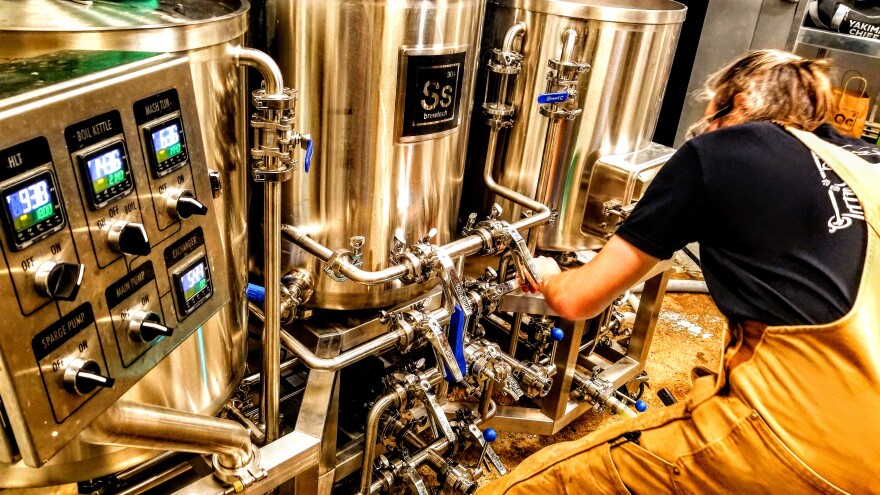Surveys have shown that Americans roughly double their alcohol consumption between Thanksgiving and New Years. According to the U.S. Department of Transportation, the Thanksgiving holiday weekend is the deadliest of the year due to drunk driving.
But market studies also show recent trends, largely fueled by millennials, away from overindulgence in the "grape and the grain." For one craft brewery in Portland, its founders are betting its entire future on that trend.
"I made a personal choice a little over two years ago to stop drinking alcohol." says KITna Brewing's co-founder, Rob Barrett. "It made a huge change in my life." But Barrett quickly realized that there were no good nonalcoholic alternatives for a craft beer enthusiast seeking complex, hoppy, malty flavors without the buzz. And that was the catalyst for KITna.
Barrett partnered with Will Fisher, who also brews traditional beer at Austin Street Brewing in Portland. Fisher says he has also started drinking KITna's nonalcoholic offerings, and he's especially pleased with the company's very first release, the first batch of which has just been bottled.
"The flavor profile on our flagship beer — it's an American Blonde, and I'd say the keynotes in that beer are a little bit of lemon, a little bit of orange peel, some grassy, straw notes, it's really, really light, has a nice hop aroma, and a slight bit of hop bitterness," says Fisher.
All those notes come from just the traditional German method of brewing, using only grain, yeast, hops and water.
Other styles are already in development. Brew production manager, Simon Burhoe, is working with head brewer Adrian-Beck Oliver to create another experimental alcohol-free beer. He points to a big, silver pot of wort.
"This is one of our trial batches for a lager actually. This will be the second beer that we're going to be releasing, sort of inspired by a pilsner," Burhoe says.

The process today for brewing nonalcoholic beer, craft style, is a lot different to past methods. Burhoe won't reveal all the secrets, but says they basically brew in such a way that the alcohol doesn't develop in the first place. Previous methods involved trying to take alcohol out of a batch, with notoriously untasty results.
Fisher says KITna is the first craft brewery in Maine dedicated exclusively to nonalcoholic beer, and as such, he sees it as more than just a business.
"There's stigma around drinking, and there's stigma about drinking without alcohol. And I think that there are these social expectations about when you can drink alcohol, how much of it. How you behave once you consume alcohol," he says.
And he says those who just choose not to drink alcohol are often teased and subjected to personal questions.
"Like, 'Oh do you have a drinking problem?' Or for a woman, "Are you pregnant?" he says.
Fisher says American society nurtures a complex and conflicted relationship between choosing to drink alcohol and choosing to abstain. Marketing over the decades has reinforced ideas, especially to men, that drinking is always associated with a good time, and "real men" do it.
"Some of that toxic frat boy culture has died down a tad," says Carla Lauter, a freelance writer and journalist who specializes in the beer industry.
Lauter says one reason a new nonalcoholic beer trend is being fueled by millennials is that, unlike their parents and grandparents' generations, it's OK for them to need different things and talk about issues.
"The younger generation has less history of that stigma. And they're also very much more accepting of the fact that people have mental health issues, or that substance abuse exists, because they've grown up in an era where that is much more openly discussed," Lauter says.
"It's not just about selling nonalcoholic beer," says Charley Zimmerman. "It's about creating a space where people feel comfortable to say 'I don't feel like drinking tonight' and it's not an issue."
Zimmerman is 26 years old and KITna's brand ambassador. She gave up an eight-year career working in restaurants and bars to get away from the alcohol.
"This idea that in order to get sober you have to hit this rock bottom — and we always talk about like, the man under the bridge who has hit rock bottom — and it doesn't always look like that for everyone. My rock bottom didn't look like that. I don't think anyone around me knew I had an issue, but for me, I knew I did," she says.
KITna is testing some mostly uncharted waters in the U.S. beer industry. Barrett says in Europe, nonalcoholic beer makes up roughly 15% of the total market. In the U.S., it's less than 1%, and in some craft beer-heavy states, such as Massachusetts, the nonalcoholic market accounts for less than one-tenth of one percent of sales.
But beer companies of all sorts are starting to catch on. Samuel Adams released its first nonalcoholic beer this summer, and Forbes magazine reported that nonalcoholic beer sales have been growing by almost 40% over each of the last two years.
At KITna, Burhoe says the small company is hoping to provide all the varieties that craft drinkers expect: ales, lagers, stouts, porters and seasonals.
Pumpkin?
"I don't think so," he says. "But I wouldn't rule out blueberries though."
In the meantime, KITna's flagship American Blonde Ale is in the state now. It's undergoing further tastings, and then it's expected to hit stores statewide next month.



